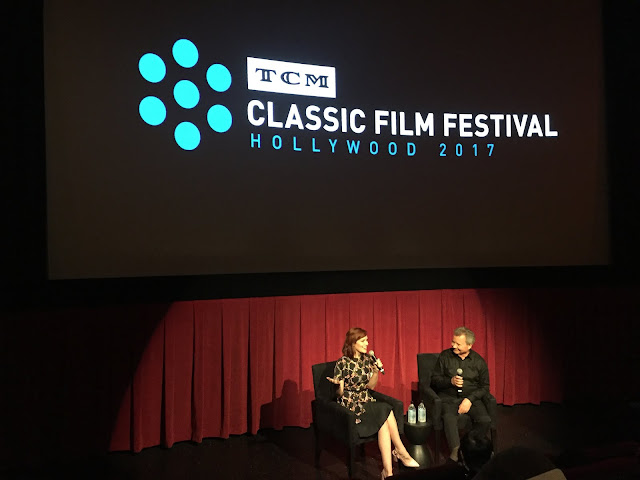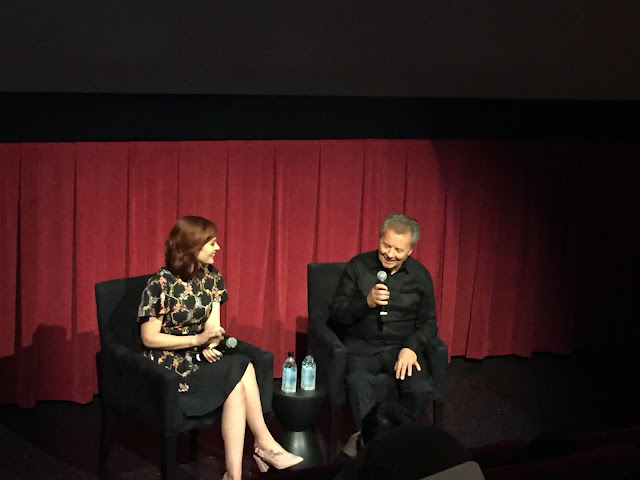This year marks the 50th anniversary of the cultural phenomenon that is The Graduate (1967). Prior to this month I had never watched the film in its entirety. Key scenes are so ingrained in our collective pop culture knowledge that there's no escaping them. And no one could spoil the movie for me because I knew the famous ending well. Why did it take me so long to watch The Graduate? I must have been holding out for just the right moment and that opportunity arose I attended this year's TCM Classic Film Festival.
 |
| Author Beverly Gray |
On the first day of the festival and a couple days before the screening, I had the opportunity to speak to author Beverly Gray on the red carpet. She's been hard at work writing a new book all about The Graduate. Here's what she had to say:
On day three of the festival, Ben Mankiewicz interviewed screenwriter and actor Buck Henry on stage at the TCL Chinese Theatre. Buck had suffered a stroke and Mankiewicz was the kindest and most patient interviewer helping Buck when we was struggling with answers. Mankiewicz reassured Buck that he was in front of the most patient crowd in the world and it was true. But we didn't have to be too patient because Buck had many clever and witty responses to Mankiewicz's questions and had us all laughing with delight.
Mankiewicz and Buck Henry discussed the making of The Graduate at length. Based on the novel by Charles Webb, Buck Henry along with Calder Willingham the story for the screen. Buck also has a small part as a hotel clerk in the film. According to Mankiewicz, Webb's book only sold a couple thousand copies. Buck had read it previously but it took producer Lawrence Truman to get the concept to director Nichols in order for the project to move forward. Buck joked that he was one of the "brave two thousand" to read the novel.
Director Mike Nichols had his eye on Robert Redford for the lead role. Looking back now it seems impossible that anyone other than Dustin Hoffman as Ben Braddock. According to Mankiewicz, Redford's persona was closer to the depiction in the book than what was presented on screen. When asked whether Redford would have been wrong for the film role, Buck Henry replied "according to Redford, yes." Nichols desperately tried to woo Redford. They had discussed the part and Redford told Nichols that he just couldn't understand the role. Nichols offered to fix anything Redford didn't like. Nichols said "Bob you must have made dates with girls in your long career as an eligible male and had them stand you up?". Redford replied, "what does that mean?" And that was the end of that.
Dustin Hoffman was under contract to be in stage production of The Producers and was let go to make The Graduate. Mankiewicz joked that Mel Brooks being married to the film's lead actress Anne Bancroft probably helped a little. Hoffman was considered by many to be an odd choice for the lead role. Buck Henry once said about Hoffman, "the reaction in Hollywood was that his nose was too big, he was funny looking, his voice was too strangled, he walks funny and he has odd cadence."
Gene Hackman was originally supposed to be in the film but he was fired three weeks into filming. Buck thought Nichols was "slightly insane" for letting him go. Mankiewicz pointed out that because Hackman was not in The Graduate he was able to make Bonnie and Clyde. As they say, when one door closes another one opens!
 |
| Dustin Hoffman in The Graduate (1967) - Photo credit: Rialto Pictures |
Did you know that the iconic shot of Anne Bancroft's leg framing Dustin Hoffman was storyboard artist Harold Michelson's idea? After you watch The Graduate for the 50th anniversary make sure you watch Daniel Raim's documentary Harold and Lillian to learn about Harold Michelson and his wife film researcher Lillian Michelson (who happens to be one of my personal heroes). Harold and Lillian opens theatrically later this month in NY and Los Angeles and will be playing in more cities soon.


































